End U.S Imperialist and Zionist Impunity!
•
Goldstone Report Finds Israel Guilty of War Crimes and Crimes Against Humanity in Gaza
•
Resistance is the Path to Peace
•
U.S. Organizes to Block Action on the Goldstone Report
• UN Human Rights Council Endorses Gaza Report and Condemns Israel
•
Highlights of Goldstone Report
•
Statement by Goldstone on the United Nations Fact Finding Mission on the Gaza Conflict
•
Why Goldstone Matters
End U.S Imperialist and Zionist Impunity!
Goldstone Report Finds Israel Guilty of War Crimes and Crimes Against Humanity in Gaza
The United Nations Human Rights Council (UNHRC) at its twelfth Special Session in Geneva, Switzerland voted on October 16 to support the report of the UN Fact Finding Mission on the Gaza Conflict. The UNHRC condemned Israel for its war crimes against Palestinians, including collective punishment, and voted to forward the report’s recommendations to the UN Security Council (UNSC). The UNSC is called on to forward the report’s findings to the International Criminal Court (ICC) if action to deal with the crimes identified is not taken by Israel in the next six months.
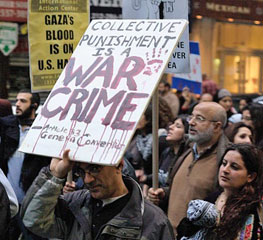 The U.S. has systematically acted to prevent the UNSC from acting on the report and instead continues to protect, fund and support Israel. Voice of Revolution demands that the Barack Obama administration instead act to have the Goldstone recommendations fully implemented, including ensuring the findings are submitted to the ICC if Israel fails to act. War crimes and crimes against humanity are problems of humanity and putting them on trial before the world at the ICC is one means to oppose them. The U.S. should lead such efforts, not block them. President Barack Obama has indicated he will recognize findings by the ICC. All the world's peoples consider the crimes against Gaza a vital matter for the ICC to deliberate on. We urge the U.S. to join in having the UNSC support the report’s findings and recommendations and have them forwarded to the ICC. The U.S. must end all support for Israel now!
The U.S. has systematically acted to prevent the UNSC from acting on the report and instead continues to protect, fund and support Israel. Voice of Revolution demands that the Barack Obama administration instead act to have the Goldstone recommendations fully implemented, including ensuring the findings are submitted to the ICC if Israel fails to act. War crimes and crimes against humanity are problems of humanity and putting them on trial before the world at the ICC is one means to oppose them. The U.S. should lead such efforts, not block them. President Barack Obama has indicated he will recognize findings by the ICC. All the world's peoples consider the crimes against Gaza a vital matter for the ICC to deliberate on. We urge the U.S. to join in having the UNSC support the report’s findings and recommendations and have them forwarded to the ICC. The U.S. must end all support for Israel now!
On September 29, Richard Goldstone, the South African judge who was appointed to head the Fact Finding Mission, presented the findings. In his presentation, he urged the UNHRC and all UN member-states to put an end to “impunity for violations of international law in Israel and the Occupied Palestinian Territories.” The 575-page report found “there is evidence indicating that serious violations of international human rights and humanitarian law were committed by Israel during the Gaza conflict, and that Israel committed actions amounting to war crimes, and possibly crimes against humanity.” The large majority of the report systematically documents the many Israeli war crimes and crimes against humanity, including massive attacks on civilian infrastructure and indiscriminate killing of hundreds of civilians, (see excerpts below). It also indicated that “Palestinian armed groups committed war crimes, as well as possibly crimes against humanity, in their repeated launching of rockets and mortars into Southern Israel.”
 With the UNHRC vote, it is now up to the UNSC to act. The report calls for Israel to act to investigate the crimes and prosecute those responsible. If Israel fails to do so within six months, the UNSC is supposed to refer the findings to the ICC for prosecution. However, the White House has said that it has the “strong view” that the Goldstone report should not be taken up by the UNSC, which is necessary for the UN to refer the findings to the ICC. The U.S. is also pressuring the Palestinians, who can go to the ICC on their own, not to do so.
With the UNHRC vote, it is now up to the UNSC to act. The report calls for Israel to act to investigate the crimes and prosecute those responsible. If Israel fails to do so within six months, the UNSC is supposed to refer the findings to the ICC for prosecution. However, the White House has said that it has the “strong view” that the Goldstone report should not be taken up by the UNSC, which is necessary for the UN to refer the findings to the ICC. The U.S. is also pressuring the Palestinians, who can go to the ICC on their own, not to do so.
U.S. Ambassador to the UN has described the report as “deeply flawed,” without speaking to the facts presented in the report, which document the character and scope of the Israeli crimes. She also considers the mandate of the Fact Finding Mission to investigate the Gaza conflict to be “biased, unbalanced, one sided and basically unacceptable. We have very serious concerns about many of the recommendations in the report.” The U.S. has also threatened to cut off aid to the PA and backed Israeli blackmail to refuse to allow the Palestinians to expand their mobile phone services, which play an important role in the economy.
If the U.S. considers the report biased, then why oppose bringing the matter to trial at the ICC where all evidence can be presented and examined? By refusing to have the matter examined, the U.S. is preventing accountability for the crimes committed, by Israel and the U.S. And while Israel has rejected the report entirely and said it will continue its attacks on Palestine, with U.S. backing, in Palestine Hamas has accepted the report’s recommendations in full.
The U.S. has so far prevented a vote by the UNSC on the report and continued efforts to prevent the ICC from hearing the case. Like the continued massive U.S. funding, provision of military weapons, and unconditional support to Israel that make the Gaza crimes possible, these actions at the UN also serve to make the U.S. responsible and guilty for continued collective punishment and genocide against the Palestinians.
Americans stand with the Palestinians and world’s peoples in demanding that impunity against Palestinians be ended and that the U.S. end its aid and protection of Israel now! Put U.S.-Israeli crimes against Palestine on trial at the ICC!
End the Occupation Now!
Condemn U.S.-Israeli Crimes Against Palestine!
Salute Resistance in Palestine!
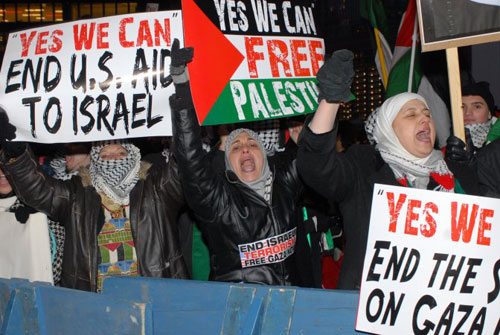
[TOP]
Goldstone Report and Peace Process
Resistance is the Path to Peace
Despite the harsh language that is used in the UN’s Goldstone Report against “Palestinian armed groups” in Gaza, the report’s systematic cataloguing of Israeli war crimes and elaboration of their magnitude — “collective punishment,” “deliberate policy of disproportionate force aimed at the civilian population,” “systemic policy of progressive isolation and deprivation of the Gaza Strip,” “humiliation and dehumanization of Palestinians,” “assault on the dignity of the people of Gaza,” and more — are seen as a potential legal basis for putting Israel’s crimes before the UN Security Council and the International Criminal Court. Both can actually take action against the continued U.S-Israeli impunity, which the human rights council and UN General Assembly cannot do.
Palestinians and many others worldwide are also calling for establishing a UN war crimes tribunal that could bring Israel to account and enforce such findings. The stand being taken is that there cannot be peace without accountability for U.S.-Israeli crimes.
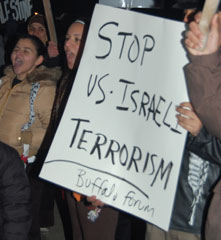 The U.S. refusal to support UN efforts while funding and protecting Israeli crimes is rendering President Barack Obama’s “peace process” illegitimate. It is the U.S. that openly opposed having the UNSC vote on the report, without which the UN cannot submit its findings to the ICC. It is the U.S. that blackmailed Palestinian Authority (PA) President Mahmoud Abbas to withdraw the PA’s resolution to forward the report, presented at the UNHRC. Doing so meant the U.S. attempted to block even discussion by the UNHRC until March 2010. This U.S. effort was defeated with the UNHRC vote October 16 (see article below).
The U.S. refusal to support UN efforts while funding and protecting Israeli crimes is rendering President Barack Obama’s “peace process” illegitimate. It is the U.S. that openly opposed having the UNSC vote on the report, without which the UN cannot submit its findings to the ICC. It is the U.S. that blackmailed Palestinian Authority (PA) President Mahmoud Abbas to withdraw the PA’s resolution to forward the report, presented at the UNHRC. Doing so meant the U.S. attempted to block even discussion by the UNHRC until March 2010. This U.S. effort was defeated with the UNHRC vote October 16 (see article below).
There has been widespread anger against Abbas and the PA for his repeated submission to U.S. blackmail. Palestinians recognize this submission as further complicity with the U.S. and Israeli Zionists in the scheme that the Obama Administration wants to impose on Palestine: a mini Palestinian state that can only materialize through abandoning both the right of return for Palestinian refugees as well as the principle of negotiating peace on the basis of the 1967 borders, especially with regards to East Jerusalem.
The Zionists have been waging a fierce campaign of intimidation, removal of the Palestinian population and attacks on Palestinian identity in East Jerusalem, a campaign also condemned by the UNHRC. People see that, despite the claim of the U.S. imperialists that they have been exerting some pressure on the Zionists to freeze the building of illegal settlements on Palestinian lands, Obama’s aim is to promote a colonialist arrangement. Palestinians are to abandon the struggle for self-determination and national liberation and settle on “improving” their situation.
It is no coincidence that the rhetoric of “improvement” and the portrayal of the Palestine problem as if it were merely a humanitarian-economic one have been aggressively used by Obama to distract from the fundamental nature of this struggle being, above all, a historical-political one. The criminalization of resistance and people’s right to fight against injustice and colonization thus occupies a significant position in Obama’s assault on history and conscience. One form this takes is the fabrication that people are united with their exploiters, and that, in the context of Palestine, the occupied are content with the conditions imposed on them by their occupiers. Refusing to compromise on the right to resist occupation and oppression thus becomes, according to the same imperialist game of disinformation, a “crime” or an “act of terrorism” against “peace.” Even having the UNSC discuss the Goldstone report — a report that itself does not condemn Israeli actions as a crime of aggression and thus a crime against the peace — is said to be against the “peace process.” Those who support such action are branded as “joining the terrorists.” Indeed, Israeli Prime Minister Netanyahu said the report “legitimizes terrorist activity.”
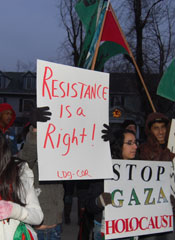 The sinister objective behind this imperialist and Zionist blackmailing is to send a message to the Palestinians that associating with and supporting the resistance would mean more hardships, while accepting the terms of compromise dictated by the Zionist colonialists and their imperialist masters would lead to “improvements.” A Palestinian state of the latter type would be lacking in historical legitimacy precisely because it will be based on abandoning the right of return, the right to East Jerusalem as historical and material capital of the Palestinians as well as the demand that Israel withdraw to the 1967 borders. These are all already contained in UN resolutions as necessary for ending the occupation of Palestine and providing conditions for peace. Instead of organizing to enforce these resolutions and forward the Goldstone report to the ICC, the U.S. is preventing such actions. “Improvement,” whatever this may relatively mean in the context of the daily humiliation and dehumanization of Palestinians by Israel, is to replace the dignity and rights of the people of Palestine.
The sinister objective behind this imperialist and Zionist blackmailing is to send a message to the Palestinians that associating with and supporting the resistance would mean more hardships, while accepting the terms of compromise dictated by the Zionist colonialists and their imperialist masters would lead to “improvements.” A Palestinian state of the latter type would be lacking in historical legitimacy precisely because it will be based on abandoning the right of return, the right to East Jerusalem as historical and material capital of the Palestinians as well as the demand that Israel withdraw to the 1967 borders. These are all already contained in UN resolutions as necessary for ending the occupation of Palestine and providing conditions for peace. Instead of organizing to enforce these resolutions and forward the Goldstone report to the ICC, the U.S. is preventing such actions. “Improvement,” whatever this may relatively mean in the context of the daily humiliation and dehumanization of Palestinians by Israel, is to replace the dignity and rights of the people of Palestine.
Resistance to defend rights is the path to peace. The Palestinians will never accept occupation and Americans and the world’s people stand with them in demanding, End the Occupation Now!
Defend Palestinian Rights!
U.S. and Israel Are Guilty of War Crimes and Crimes Against the Peace!
[TOP]
U.S. Organizes to Block Action
on the Goldstone Report
The report issued by the United Nations Fact Finding Mission on the Gaza Conflict, known as the Goldstone report, provides hundreds of pages of factual information concerning the Israeli war crimes against the Palestinians. The report was first released September 14. Justice Goldstone, of South Africa, headed the Mission and presented the final report to the United Nations Human Rights Council (UNHRC) on September 29.
The U.S. denounced the report from the beginning and has acted forcefully to ensure the UN Security Council (UNSC) does not take it up. It is the UNSC that has authority to act on its findings. It is also the UNSC that must forward the findings to the International Criminal Court (ICC) on behalf of the UN. Simply having such a debate in the UNSC, given the overwhelming evidence of war crimes gathered by a UN Mission, would be a blow to the U.S.-Israeli impunity against Palestine.
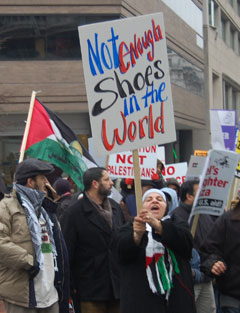 The U.S. has acted to block any such discussion and also acted to prevent even the UNHRC — which has no authority to implement the report’s recommendations — from voting on the report at this time. While initially succeeding, these U.S. efforts have now backfired, particularly for President Barack Obama. He has indicated that he will respect findings by the ICC. But his administration has now openly organized to prevent the ICC from even hearing the case. Doing so has made clear the U.S. does not want Israel, and its own funding, arming, and protection of Israeli crimes, on trial before the world.
The U.S. has acted to block any such discussion and also acted to prevent even the UNHRC — which has no authority to implement the report’s recommendations — from voting on the report at this time. While initially succeeding, these U.S. efforts have now backfired, particularly for President Barack Obama. He has indicated that he will respect findings by the ICC. But his administration has now openly organized to prevent the ICC from even hearing the case. Doing so has made clear the U.S. does not want Israel, and its own funding, arming, and protection of Israeli crimes, on trial before the world.
The U.S. acted instead to try and discredit the report and prevent a vote even by the UNHRC. The Goldstone report was initially released September 14. U.S. Ambassador to the UN Susan Rice on September 17 said the UNHRC mandate for the report was “unbalanced, one sided and basically unacceptable.” She said, “We have very serious concerns about many of the recommendations in the report. We will expect and believe that the appropriate venue for this report to be considered is the Human Rights Council and that is our strong view. Most importantly, our view is that we need to be focused on the future. This is a time to work to cement progress towards the resumption of negotiations” between Israel and the Palestinians. In this manner the crimes are to be ignored and holding Israel accountable for war crimes has no place in the peace process.
Obama met with Palestinian Authority President Mahmoud Abbas and Israeli Prime Minister Netanyahu on September 22. Under U.S. demands, Abbas abandoned the demand of Palestinians that Israel end settlement expansion — a violation of previous agreements and something the U.S. says it is also asking for — before negotiations resumed. Instead, the settlements continue and negotiations resumed at the September 22 meeting.
The UNHRC was then expected to meet to discuss and vote on the findings of the Goldstone Report and a Palestinian resolution to forward them to the UNSC on October 2. The administration said that pursuing the report would “disrupt the peace process.” Again under U.S. pressure, Abbas withdrew the resolution. By forcing the withdrawal, the U.S. hoped to have the UNHRC vote postponed until March 2010, the next scheduled meeting of the UNHRC.
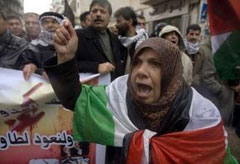 Palestinians worldwide immediately expressed their outrage at the withdrawal by Abbas and demanded that U.S.-Israeli impunity be addressed, saying pursuing the Goldstone report recommendations was one means to do so. Reports in the Arab press relate how both President Obama and Secretary of State Hillary Clinton phoned Abbas threatening that the PA should not “join the ranks of terrorists and those who incite terrorism” by choosing to support a possible Human Rights Council resolution to refer the Goldstone report findings to the UNSC and the ICC. The reports add that further blackmail was done by the U.S. emphasizing that if the PA did not abandon the report it would “seriously undermine the PA and the financial aid it receives from the U.S.” These reports also refer to Israeli threats that supporting a resolution against Israeli crimes in Gaza would bring about financial and economic strains to the PA and the West Bank, one example of which was the threat not to release a share of the radio spectrum that would enable expanding mobile phone services in the West Bank. The U.S.-Israeli blackmail forced Abbas to submit.
Palestinians worldwide immediately expressed their outrage at the withdrawal by Abbas and demanded that U.S.-Israeli impunity be addressed, saying pursuing the Goldstone report recommendations was one means to do so. Reports in the Arab press relate how both President Obama and Secretary of State Hillary Clinton phoned Abbas threatening that the PA should not “join the ranks of terrorists and those who incite terrorism” by choosing to support a possible Human Rights Council resolution to refer the Goldstone report findings to the UNSC and the ICC. The reports add that further blackmail was done by the U.S. emphasizing that if the PA did not abandon the report it would “seriously undermine the PA and the financial aid it receives from the U.S.” These reports also refer to Israeli threats that supporting a resolution against Israeli crimes in Gaza would bring about financial and economic strains to the PA and the West Bank, one example of which was the threat not to release a share of the radio spectrum that would enable expanding mobile phone services in the West Bank. The U.S.-Israeli blackmail forced Abbas to submit.
However, Palestinians and world public opinion was such that the battle did not end there. Libya moved to request that the UNSC hold a special session on October 7 to discuss the Goldstone report. The request was eventually rejected, keeping a vote on the report itself off the agenda. Instead the periodical meeting on the Middle East that was scheduled for October 20 was advanced and held on Wednesday October 14. The meeting had some discussion on the report and the recent Israeli state violence against Palestinians in East Jerusalem. The U.S. made certain no resolution was adopted.
The action by Abbas to withdraw PA support was firmly opposed by Palestinians and peoples worldwide who defend their heroic struggle. Indeed, it served mainly to call into question the legitimacy of the PA and Abbas. In an effort to salvage the situation, Abbas backed the Libyan request and also submitted a new resolution to the UNHRC condemning Israeli violations in Gaza, East Jerusalem and the rest of the West Bank. The Council took up this resolution and passed it, condemning Israel and calling on the UNSC to ensure action is taken to correct the crimes addressed in the Goldstone Report. If this is not done within six months, the UNSC is to submit the Goldstone findings to the ICC. In this manner, despite U.S. efforts, the outrage of the peoples put the Goldstone report back on the UNSC agenda. However, the next test will be six months away.
[TOP]
UN Human Rights Council Endorses Gaza Report
and Condemns Israel
The Human Rights Council today adopted a resolution that strongly condemned continuing violations of human rights by Israel in the Occupied Palestinian territories, in particular in East Jerusalem, and endorsed the recommendations set out in the report of the Fact-Finding Mission to Gaza led by Justice Goldstone and by the High Commissioner for Human Rights, and called for their implementation.
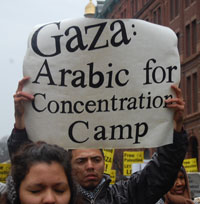 In its resolution, which was adopted by a vote of 25 in favor, six against, and 11 abstentions, the Council strongly condemned all policies and measures taken by Israel, the occupying Power, including those limiting access of Palestinians to their properties and holy sites particularly in Occupied East Jerusalem, on the basis of national origin, religion, sex, age or any other discriminatory ground, which were in grave violation of the Palestinian People’s civil, political, economic, social and cultural rights. It also condemned the recent Israeli violations of human rights in Occupied East Jerusalem, particularly the confiscation of lands and properties, the demolishing of houses, the construction and expansion of settlements, the continuous construction of the separation Wall, the restrictions on the freedom of movement of the Palestinian citizens of East Jerusalem, as well as the continuous digging and excavation works in and around Al-Aqsa mosque and its vicinity. The Council demanded that Israel allow Palestinian citizens and worshippers unhindered access to their properties and religious sites in the Occupied Palestinian Territory and that it immediately cease all digging and excavation works and activities beneath and around Al Aqsa Mosque.
In its resolution, which was adopted by a vote of 25 in favor, six against, and 11 abstentions, the Council strongly condemned all policies and measures taken by Israel, the occupying Power, including those limiting access of Palestinians to their properties and holy sites particularly in Occupied East Jerusalem, on the basis of national origin, religion, sex, age or any other discriminatory ground, which were in grave violation of the Palestinian People’s civil, political, economic, social and cultural rights. It also condemned the recent Israeli violations of human rights in Occupied East Jerusalem, particularly the confiscation of lands and properties, the demolishing of houses, the construction and expansion of settlements, the continuous construction of the separation Wall, the restrictions on the freedom of movement of the Palestinian citizens of East Jerusalem, as well as the continuous digging and excavation works in and around Al-Aqsa mosque and its vicinity. The Council demanded that Israel allow Palestinian citizens and worshippers unhindered access to their properties and religious sites in the Occupied Palestinian Territory and that it immediately cease all digging and excavation works and activities beneath and around Al Aqsa Mosque.
The Council also condemned the non-cooperation by Israel with the Independent International Fact-Finding Mission. The Council endorsed the recommendations contained in the Mission’s report and called upon all concerned parties to ensure their implementation. It also recommended to the General Assembly that it consider the report of the Fact-Finding Mission during the main part of its sixty-fourth session. Similarly, the Council endorsed the recommendations contained in the first periodic report of the High Commissioner for Human Rights in this area, and called upon all concerned parties, including United Nations bodies, to ensure their implementation.
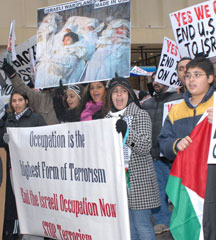 The United Nations Fact Finding Mission on the Gaza Conflict, led by Justice Richard Goldstone, was tasked by the Council “to investigate all violations of international human rights law and international humanitarian law that might have been committed at any time in the context of the military operations that were conducted in Gaza during the period from 27 December 2008 and 18 January 2009, whether before, during or after.” The report of the Mission, presented to the Council’s twelfth session, concluded that, while the Israeli Government sought to portray its operations as a response to rocket attacks in the exercise of its right to self defense, the Israeli plan had been directed, at least in part, at the people of Gaza as a whole. The report highlighted the treatment of many civilians detained or even killed while trying to surrender as one manifestation of the way in which the effective rules of engagement, standard operating procedures and instructions to the troops on the ground appeared to have been framed in order to create an environment in which due regard for civilian lives and basic human dignity was replaced with the disregard for basic international humanitarian law and human rights norms. The destruction of food supply installations, water sanitation systems, concrete factories and residential houses had been the result of a deliberate and systematic policy by the Israeli armed forces and not because those objects had presented a military threat.
The United Nations Fact Finding Mission on the Gaza Conflict, led by Justice Richard Goldstone, was tasked by the Council “to investigate all violations of international human rights law and international humanitarian law that might have been committed at any time in the context of the military operations that were conducted in Gaza during the period from 27 December 2008 and 18 January 2009, whether before, during or after.” The report of the Mission, presented to the Council’s twelfth session, concluded that, while the Israeli Government sought to portray its operations as a response to rocket attacks in the exercise of its right to self defense, the Israeli plan had been directed, at least in part, at the people of Gaza as a whole. The report highlighted the treatment of many civilians detained or even killed while trying to surrender as one manifestation of the way in which the effective rules of engagement, standard operating procedures and instructions to the troops on the ground appeared to have been framed in order to create an environment in which due regard for civilian lives and basic human dignity was replaced with the disregard for basic international humanitarian law and human rights norms. The destruction of food supply installations, water sanitation systems, concrete factories and residential houses had been the result of a deliberate and systematic policy by the Israeli armed forces and not because those objects had presented a military threat.
[TOP]
Highlights of Goldstone Report
In detailing Israeli violations before, during and after the 2008 – 2009 U.S. backed Israeli war on Gaza, the Goldstone report confirmed what had already been documented in terms of U.S-Zionist atrocities against Palestinians throughout the long history of occupation. It debunks several of the myths of the Zionist leadership and military, especially that the war was in “self-defense”: the UN Mission found evidence that Israel’s military operations were “intentionally” directed against the “people of Gaza as a whole,” the crime of “the arbitrary deprivation of life,” which was “premised on a deliberate policy of disproportionate force aimed not at the enemy but at the … civilian population.”
Israel failed to respect the mandate in international law to distinguish between combatants and civilians. Its attacks were “designed to punish, humiliate and terrorize a civilian population.” The report underlined how the Zionist occupation of the Palestinian Territories, and consequently Israel’s failure to uphold its responsibilities as an occupying force towards the occupied, was the root-cause of the problem, which, “far from quelling resistance, breed[s] it, including its violent manifestations.” The collective punishment of Gazans, the report concludes, came from intentionally targeting civilians, and through blockades and sanctions on the Strip, as well as the “destruction of food supply installations, water sanitation systems, concrete factories and residential houses.”
Another of Israel’s war crimes was the use of human shields, which the report defines as “an assault on the dignity of the people.” Other manifestations of this assault on dignity were the “unlawful detentions” of Palestinians and the “vandalizing of houses when occupied and the way in which people were treated [as well as the] graffiti on the walls, the obscenities and often racist slogans [which] all constituted an overall image of humiliation and dehumanization of the Palestinian population.”
 With reference to the aggression against Gaza, the report cites the use of phosphorus shells against the UNRWA compound and al-Quds and al-Wafa hospitals as a violation of the Fourth Geneva Convention. Other examples of Israeli war crimes and violations of international law and international humanitarian laws that the report lists are: the “deliberate attacks on civilians and civilian objects,” such as the attack on the Palestinian Legislative Council and the main prison in Gaza; the blocking of access of “humanitarian organizations … to the wounded”; the failure to “respect the principle of proportionality … by deliberately attacking police stations and killing large numbers of policemen”; the “questioning of Palestinian civilians under the threat of death or injury to extract information about Hamas”; the rounding-up, detention and inhumane treatment of persons “protected under the Fourth Geneva Conventions,” especially women.
With reference to the aggression against Gaza, the report cites the use of phosphorus shells against the UNRWA compound and al-Quds and al-Wafa hospitals as a violation of the Fourth Geneva Convention. Other examples of Israeli war crimes and violations of international law and international humanitarian laws that the report lists are: the “deliberate attacks on civilians and civilian objects,” such as the attack on the Palestinian Legislative Council and the main prison in Gaza; the blocking of access of “humanitarian organizations … to the wounded”; the failure to “respect the principle of proportionality … by deliberately attacking police stations and killing large numbers of policemen”; the “questioning of Palestinian civilians under the threat of death or injury to extract information about Hamas”; the rounding-up, detention and inhumane treatment of persons “protected under the Fourth Geneva Conventions,” especially women.
The report concluded that “the conditions resulting from deliberate actions of the Israeli armed forces and the declared policies of the Government with regard to the Gaza Strip before, during and after the military operation cumulatively indicate the intention to inflict collective punishment on the people of the Gaza Strip.”
The report documents Israeli violations committed in the West Bank during the war on Gaza, such as the use of “excessive or lethal force” against people protesting the Zionist aggression, Israel’s failure to quell the “increase in settler violence … against Palestinian civilians and their property” in the West Bank, and the “virtual deportation” of Palestinians from East Jerusalem. An important issue that the report emphasizes is how Palestinians detained by Israel are deprived due legal process mandated by international law because of the military court system to which Palestinians are subjected.
Another Israeli violation of international law that the report indicates is the continued construction of settlements, which, together with the Apartheid Wall and the arbitrary restriction of movement and access, prevents a “viable, contiguous and sovereign Palestinian State from arising, [which violates] the right to self-determination.” The report additionally calls on Israel to “cease interference with national political processes in the Occupied Palestinian Territories, and as a first step release all the members of the Palestinian Legislative Council currently in detention and allow all members of the Council to move between Gaza and the West Bank so that it may resume functioning.”
 That the report calls for holding the occupiers responsible for their well planned and intentional actions during the war on Gaza is an important reminder that a just peace will not be possible if the impunity of the U.S.- Zionist occupation and war crimes go unchallenged. The UN and its member-states must work for effecting accountability and justice unrecognized and unmet. Israel, funded, backed and protected by the U.S. imperialists must also be held accountable, as without this backing Israel could not commit its crimes. Indeed, it is the U.S. that systematically blocks the UN, especially the UNSC from enforcing UN resolutions concerning Israel’s occupation and war crimes.
That the report calls for holding the occupiers responsible for their well planned and intentional actions during the war on Gaza is an important reminder that a just peace will not be possible if the impunity of the U.S.- Zionist occupation and war crimes go unchallenged. The UN and its member-states must work for effecting accountability and justice unrecognized and unmet. Israel, funded, backed and protected by the U.S. imperialists must also be held accountable, as without this backing Israel could not commit its crimes. Indeed, it is the U.S. that systematically blocks the UN, especially the UNSC from enforcing UN resolutions concerning Israel’s occupation and war crimes.
[TOP]
Statement by Goldstone on the United Nations Fact Finding Mission on the Gaza Conflict
My colleagues and I are here today to present to the Council the final report of the United Nations Fact Finding Mission on the Gaza Conflict. Since the release of the advance version of the report two weeks ago, we have witnessed many attestations of support, but also a barrage of criticism towards our findings as well as public attacks against the Members of the Mission. We will not address these attacks as we believe that the answers to those who have criticized us are in the findings of the report. I have, however, to strongly reject one major accusation leveled against the Mission — the one that portrays our efforts as being politically motivated.
Let me repeat before this Council what I have already stated on many occasions:
We accepted this Mission because we believe deeply in the rule of law, humanitarian law, human rights, and the principle that in armed conflict civilians should to the greatest extent possible be protected from harm.
We accepted with the conviction that pursuing justice is essential and that no state or armed group should be above the law. Failing to pursue justice for serious violations during any conflict will have a deeply corrosive effect on international justice.
We accepted out of a deep concern for the hundreds of civilians who needlessly died and those who suffered injury and dislocation of their lives.
We accepted because we believe that the perpetrators of serious violations must be held to account.
We do not claim to be immune from error. After the release of the report we have received a number of comments from people who are sincerely interested in the truth. We have considered them and where relevant redressed inaccuracies in the final version of the report which is today before you.
We regret that the response to date of the Government of Israel avoids dealing with the substance of the report.
Mr. President
As you all know, the Mission was established in April of this year with the mandate to investigate “all violations of International Human Rights Law and International Humanitarian Law that might have been committed at any time in the context of the military operations that were conducted in Gaza from 27 December 2008 – 18 January 2009, whether before, during or after.”
Ambassador Uhomoibhi and I announced the establishment of the team at a press conference in April and he brought the mandate of the Mission before this Council in June. The mandate of the mission was to look at all parties: Israel; the Palestinian Authority; Hamas, which governs Gaza; and armed Palestinian groups.
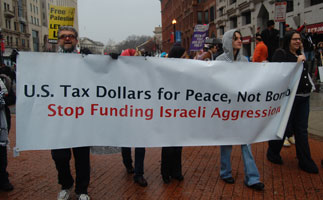 Soon after its establishment the Mission was faced with one of its major challenges: the decision of the Government of Israel not to cooperate with it and its implicit refusal to give us access to Gaza, the West Bank and to southern Israel. We decided not to allow this lack of cooperation to prevent the Mission from discharging its mandate. […]
Soon after its establishment the Mission was faced with one of its major challenges: the decision of the Government of Israel not to cooperate with it and its implicit refusal to give us access to Gaza, the West Bank and to southern Israel. We decided not to allow this lack of cooperation to prevent the Mission from discharging its mandate. […]
The first field visit by the Mission Members was conducted in the Gaza Strip from June 1-5, 2009, during which we held meetings, conducted interviews with victims and witnesses and visited the sites of incidents. The Members of the Mission were in Gaza again from June 26 to 1 July. […]
As part of its investigation process, the Mission held a second set of public hearings. In the two rounds of public hearings, 38 witnesses, victims and experts gave testimony. The aim of holding the hearings publicly was to give a voice to those who had direct experiences and expertise that related to the mandate of the Mission. The Mission reviewed reports produced by various organizations and institutions as well as submissions on matters of fact and law relevant to its inquiry.
The Mission consulted with a wide range of interlocutors. They included victims and witnesses, Palestinian, Israeli and international NGOs, United Nations and other international organizations, community organizations, human rights defenders, medical and other professionals, legal and military experts, authorities and other sources of reliable information relevant to the Mission’s mandate. These interlocutors were both within and outside Israel and the occupied Palestinian territory.
The Mission conducted 188 individual interviews, reviewed over 10,000 pages of documentation and viewed some 1200 photographs, including satellite imagery and videotapes. […]
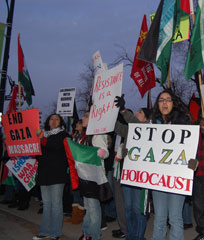 In Chapter XI of the Report, for example we detail a number of specific incidents in which Israeli forces launched direct attacks against civilians with lethal consequences. These were, with only one exception, where the facts establish that there was no military objective or advantage that could justify the attacks. You will find details of the other 35 incidents in the Report. Some of them relate to the use by the Israel Defense Forces of human shields in violation of an earlier ruling by the Israel Supreme Court outlawing such conduct.
In Chapter XI of the Report, for example we detail a number of specific incidents in which Israeli forces launched direct attacks against civilians with lethal consequences. These were, with only one exception, where the facts establish that there was no military objective or advantage that could justify the attacks. You will find details of the other 35 incidents in the Report. Some of them relate to the use by the Israel Defense Forces of human shields in violation of an earlier ruling by the Israel Supreme Court outlawing such conduct.
The Mission investigated in some detail the effects on the civilian population in Southern Israel of the sustained rocket and mortar attacks from Palestinian armed groups in Gaza. We detail the suffering of victims and the highly prejudicial effects of these acts on the towns and cities that fall within the range of the rockets and mortars.
The Mission decided that in order to understand the effect of the Israeli military operations on the infrastructure and economy of Gaza, and especially its food supplies, it was necessary to have regard to the effects of the blockade that Israel has imposed on the Gaza Strip for some years and has been tightened since Hamas became the controlling authority of Gaza.
The Mission found that the attack on the only remaining flour producing factory, the destruction of a large part of the Gaza egg production, the bulldozing of huge tracts of agricultural land, and the bombing of some two hundred industrial facilities, could not on any basis be justified on military grounds. Those attacks had nothing whatever to do with the firing of rockets and mortars at Israel.
The Mission looked closely and sets out in the Report statements made by Israeli political and military leaders in which they stated in clear terms that they would hit at the “Hamas infrastructure.”
If “infrastructure” were to be understood in that way and become a justifiable military objective, it would completely subvert the whole purpose of International Humanitarian Law built up over the last 100 years and more. It would make civilians and civilian buildings justifiable targets. These attacks amounted to reprisals and collective punishment and constitute war crimes.
The Government of Israel has a duty to protect its citizens. That in no way justifies a policy of collective punishment of a people under effective occupation, destroying their means to live a dignified life and the trauma caused by the kind of military intervention the Israeli Government called Operation Cast Lead. […]
Since the issue of the advance copy of the Report it has been rejected in vehement terms by the Government of Israel. The call for transparent investigations has been rejected. The Government of Israel wishes to restrict its investigations to secret inquiries by the Military investigating itself. That would clearly not satisfy the legitimate expectations of the many victims of the Israeli military operations.
A word about accountability. It has been my experience in many regions of the world, including my own country, South Africa that peace and reconciliation depend, to a great extent, upon public acknowledgement of what victims suffer. That applies no less in the Middle East. It is a pre-requisite to the beginning of the healing and meaningful peace process...
The lack of accountability for war crimes and possible crimes against humanity has reached a crisis point; the ongoing lack of justice is undermining any hope for a successful peace process and reinforcing an environment that fosters violence. Time and again, experience has taught us that overlooking justice only leads to increased conflict and violence.
In conclusion, may I say that the Mission hopes that the substance of this report will be used to strengthen initiatives for peace in the region. The mission is convinced that the international community must confront the realities highlighted in this report and that by doing so find a meaningful basis for the pursuit of peace and security for all the people of the region. […]
[TOP]
So why did the Israeli government boycott the commission? The real answer is quite simple: they knew full well that the commission, any commission, would have to reach the conclusions it did reach. — Uri Avnery, Israeli peace activist and former Knesset member
Richard Goldstone, former judge of South Africa’s Constitutional Court, the first prosecutor at The Hague on behalf of the International Criminal Court for Former Yugoslavia, and anti-apartheid campaigner reports that he was most reluctant to take on the job of chairing the UN fact-finding mission charged with investigating allegations of war crimes committed by Israel and Hamas during the three-week Gaza War of last winter. The reluctance was overcome only because he and his fellow commissioners were “professionals committed to an objective, fact-based investigation.” The four-person fact-finding mission was composed of widely respected and highly qualified individuals, including distinguished international law scholar Christine Chinkin, a professor at the London School of Economics. Undoubtedly adding complexity to Goldstone’s decision is the fact that he is Jewish, with deep emotional and family ties to Israel and Zionism, bonds solidified by his long association with several organizations active in Israel.
Despite the impeccable credentials of the commission members, and the worldwide reputation of Richard Goldstone as a person of integrity and political balance, as well as of being an eminent jurist, Israel refused cooperation from the outset. It did not even allow the UN undertaking to enter Israel or the Palestinian territories, forcing reliance on the Egyptian government to allow the UN mission entry to Gaza at the Rafah Crossing. As Uri Avnery observes, however much Israel may attack the commission report as one-sided and unfair, the only plausible explanation for its refusal to cooperate with a UN fact-finding mission of this sort and seize the opportunity to tell its side of the story was that it had nothing to tell that could hope to overcome the overwhelming evidence of Israeli failure to carry out its attacks on Gaza last winter in accordance with international laws of war. No credible international commission could reach any set of conclusions other than those reached by the Goldstone Report on the central allegations in question.
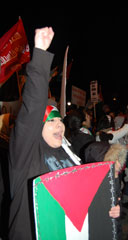 In substantive respects, the Goldstone Report adds nothing new. Its main contribution is to confirm widely reported and analyzed Israeli military practices during the December-January Gaza War. There had been several reliable reports already issued, including by Amnesty International, Human Rights Watch, and a variety of respected Israeli human rights groups. Perhaps, most damning before the Goldstone Report was the publication of a document entitled Breaking the Silence, containing commentaries by 30 members of the Israeli army who had taken part in Operation Cast Lead (the official Israeli name for the Gaza War). The sense emerges from the testimony of these Israeli soldiers, who were in no sense critical of Israel or even of the Gaza War as such, that Israeli policy emerged out of a combination of efforts “to teach the people of Gaza a lesson for their support of Hamas” and to keep Israeli army casualties as close to zero as possible even if that meant massive death and destruction for innocent Palestinians.
In substantive respects, the Goldstone Report adds nothing new. Its main contribution is to confirm widely reported and analyzed Israeli military practices during the December-January Gaza War. There had been several reliable reports already issued, including by Amnesty International, Human Rights Watch, and a variety of respected Israeli human rights groups. Perhaps, most damning before the Goldstone Report was the publication of a document entitled Breaking the Silence, containing commentaries by 30 members of the Israeli army who had taken part in Operation Cast Lead (the official Israeli name for the Gaza War). The sense emerges from the testimony of these Israeli soldiers, who were in no sense critical of Israel or even of the Gaza War as such, that Israeli policy emerged out of a combination of efforts “to teach the people of Gaza a lesson for their support of Hamas” and to keep Israeli army casualties as close to zero as possible even if that meant massive death and destruction for innocent Palestinians.
Given this background of a prior international consensus on the unlawfulness of Operation Cast Lead, we must first wonder why this massive report of 575 pages has been greeted with such alarm by Israel and given so much attention in the world media. It added little to what was previously known. In many ways the Goldstone Report endorses the misleading main line of the Israeli narrative by assuming that Israel was acting in self-defense against a terrorist adversary. The report does describe the success of the ceasefire with Hamas that had cut violence in southern Israel to very low levels, and attributes its disruption to Israel’s attack on November 4, 2008, but nowhere does it make the inference that would seem to follow, that the Israeli attacks were an instance of the international crime of aggression. […] The report also does draw attention to the unlawful blockade that has restricted the flow of food, fuel and medical supplies to subsistence levels in Gaza before, during and since Operation Cast Lead. Such a blockade is a flagrant instance of collective punishment, explicitly prohibited by Article 33 of the Fourth Geneva Convention.
All along Israel had rejected international criticism of its conduct of military operations in Gaza, claiming that the Israeli army was the most moral fighting force on the face of the earth. The Israeli forces conducted some nominal investigations of alleged unlawful behavior that consistently vindicated the military tactics and top Israeli political leaders steadfastly promised to protect any Israeli military officer or political leader internationally accused of war crimes.
In view of this extensive background of confirmed allegation and angry Israeli rejection, why has the Goldstone Report been treated in Tel Aviv as a bombshell that is deeply threatening to Israel’s stature as a sovereign state? Israel’s president, Shimon Peres, calling the report “a mockery of history” that “fails to distinguish the aggressor and a state exercising the right of self-defense,” insisted that it “legitimizes terrorist activity, the pursuit of murder and death.” The line of response to any criticism of Israel’s behavior in occupied Palestine, especially if it comes from the UN or human rights NGOs, is to cry “foul play!” and avoid any real look at the substance of the charges. It is an example of what I call “the politics of deflection,” attempting to shift the attention of an audience away from the message to the messenger. The more damning the criticism, the more ferocious the response. From this perspective, the Goldstone Report obviously hit the mark! Leveling such a harsh attack against a person as deeply sympathetic to Israel as Judge Goldstone indicates that no truth-teller will be exempted from vilification.
 Considered more carefully, there are some good reasons for Israel’s panicked reaction to this damning report. First, it does come with the backing of an eminent international personality who cannot credibly be accused of anti-Israel bias, making it harder to deflect attention from the findings no matter how loud is the screaming of “foul play.” Any fair reading of the report would show that it was balanced, took full and sensitive account of Israel’s arguments relating to security, and indeed gave Israel the benefit of the doubt on some key issues. Secondly, the unsurprising findings are coupled with strong recommendations that go well beyond previous reports. Two are likely causing the Israeli leadership great worry: the report recommends strongly that if Israel and Hamas do not themselves within six months engage in an investigation and follow-up action that meets international standards of objectivity with respect to these violations of the laws of war, then the Security Council should be brought into the picture, being encouraged to consider referring the whole issue of Israeli and Hamas accountability to the prosecutor of the International Criminal Court in The Hague. Even if Israel is spared this indignity by the diplomatic muscle of the United States, and possibly some European governments, the negative public relations implications of a failure to abide by this report could be severe.
Considered more carefully, there are some good reasons for Israel’s panicked reaction to this damning report. First, it does come with the backing of an eminent international personality who cannot credibly be accused of anti-Israel bias, making it harder to deflect attention from the findings no matter how loud is the screaming of “foul play.” Any fair reading of the report would show that it was balanced, took full and sensitive account of Israel’s arguments relating to security, and indeed gave Israel the benefit of the doubt on some key issues. Secondly, the unsurprising findings are coupled with strong recommendations that go well beyond previous reports. Two are likely causing the Israeli leadership great worry: the report recommends strongly that if Israel and Hamas do not themselves within six months engage in an investigation and follow-up action that meets international standards of objectivity with respect to these violations of the laws of war, then the Security Council should be brought into the picture, being encouraged to consider referring the whole issue of Israeli and Hamas accountability to the prosecutor of the International Criminal Court in The Hague. Even if Israel is spared this indignity by the diplomatic muscle of the United States, and possibly some European governments, the negative public relations implications of a failure to abide by this report could be severe.
Thirdly, whatever happens in the UN System, and at the Human Rights Council in Geneva, the weight of the report will be felt by world public opinion. Ever since the Gaza War, the solidity of Jewish support for Israel has been fraying at the edges, and will likely now fray much further. More globally, a very robust boycott, divestment and sanctions movement has been gaining momentum, especially since the Gaza War, and the Goldstone Report will clearly lend added support to such initiatives. There is a growing sense around the world that the only chance for the Palestinians to achieve some kind of just peace depends on shaping the outcome by way of the symbols of legitimacy, what I have called the “Legitimacy War.” Increasingly, the Palestinians have been winning this second, non-military war. […]
A fourth reason for Israeli worry stemming from the report is the green light given to national courts throughout the world to enforce international criminal law against Israeli suspects should they travel abroad. Such suspects could be detained for prosecution or extradition in some third country. These Israelis could be charged with war crimes arising from their involvement in the Gaza War, convicted, and sentenced to imprisonment. Such an eventuality is unlikely, but its mere prospect gives rise to deep concern. […]
Of course, Israel will fight back. It has already launched a media and diplomatic blitz designed to portray the Goldstone Report as so one-sided and inaccurate as to be unworthy of serious attention. The United States government has without explanation disappointingly endorsed this view, and apparently rejected the central recommendation in the Goldstone Report that the Security Council be assigned the task of implementing its findings. US Ambassador to the UN Susan Rice evidently told a closed session of the Security Council on September 16, just a day after the report was issued, that “[w]e have serious concerns about many recommendations in the report.” Elaborating on this, Ambassador Rice indicated that the UN Human Rights Council, which has no implementing authority, is the only proper venue for any action to be taken on the basis of the report. The initial struggle will likely be whether to follow the recommendation of the report to have the Security Council seized of the issue so as to consider referring issues of individual accountability for war crimes to the International Criminal Court. Of course, such a referral could be blocked by a veto from the United States or other permanent members, but even a discussion in the Security Council would be a severe setback for Israel.
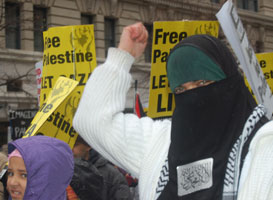 There are reasons to applaud the forthrightness and comprehensiveness of the report, its care, and scrupulous willingness to conclude that both Israel and Hamas seem responsible for behavior that appears to constitute war crimes, if not crimes against humanity. Although Israel has succeeded in having the issue of one-sidedness focus on fairness to Israel, there are also some reasons to insist that the report falls short of Palestinian hopes. For one thing, the report takes for granted the dubious proposition that Israel was entitled to act against Gaza in self-defense, thereby excluding enquiry into whether crimes against peace in the form of aggression had taken place by the launching of the attack. In this respect, although the report takes notice of the temporary ceasefire that had cut rocket fire directed at Israel practically to zero in the months preceding the attacks, it seems to avoid drawing any legal conclusions as to the bearing of this context in which the Gaza War was initiated. The report also ignores Hamas’s repeated efforts to extend the ceasefire indefinitely provided Israel lifted its unlawful blockade of Gaza. Israel disregarded this seemingly available diplomatic alternative to war to achieve security on its borders. Recourse to war is, even if the facts were to justify self-defense, according to international law a last resort. By ignoring Israel’s initiation of a one-sided war, the Goldstone Report implicitly accepts the dubious central premise of Operation Cast Lead, and avoids making a finding of aggression.
There are reasons to applaud the forthrightness and comprehensiveness of the report, its care, and scrupulous willingness to conclude that both Israel and Hamas seem responsible for behavior that appears to constitute war crimes, if not crimes against humanity. Although Israel has succeeded in having the issue of one-sidedness focus on fairness to Israel, there are also some reasons to insist that the report falls short of Palestinian hopes. For one thing, the report takes for granted the dubious proposition that Israel was entitled to act against Gaza in self-defense, thereby excluding enquiry into whether crimes against peace in the form of aggression had taken place by the launching of the attack. In this respect, although the report takes notice of the temporary ceasefire that had cut rocket fire directed at Israel practically to zero in the months preceding the attacks, it seems to avoid drawing any legal conclusions as to the bearing of this context in which the Gaza War was initiated. The report also ignores Hamas’s repeated efforts to extend the ceasefire indefinitely provided Israel lifted its unlawful blockade of Gaza. Israel disregarded this seemingly available diplomatic alternative to war to achieve security on its borders. Recourse to war is, even if the facts were to justify self-defense, according to international law a last resort. By ignoring Israel’s initiation of a one-sided war, the Goldstone Report implicitly accepts the dubious central premise of Operation Cast Lead, and avoids making a finding of aggression.
Also disappointing was the failure of the report to comment on the Israeli denial of a refugee option to the civilian population trapped in the tiny, crowded combat zone that constitutes the Gaza Strip. Israel closed all crossings during the period of the Gaza War, allowing only Gaza residents with foreign passports to leave. It is rare in modern warfare that civilians are not given the option to become refugees. Although there is no specific provision of the laws of war requiring a state at war to allow civilians to leave the combat zone, it seems like an elementary humanitarian requirement, and should at least have been mentioned either as part of customary international law or as a gap in the law that should be filled. The importance of this issue is reinforced by many accounts of the widespread post-traumatic stress experienced by the civilians in Gaza, especially children that comprise 53 per cent of the population. One might also notice that the report accords considerable attention to Gilad Shalit, the one Israeli soldier held prisoner by Hamas in Gaza, recommending his release on humanitarian grounds, while making only a very general recommendation that Israel release some of the thousands of Palestinians being held under conditions of harsh detention, suggesting that children especially should be released. […]
Despite these limitations, the report is a historic contribution to the Palestinian struggle for justice, an impeccable documentation of a crucial chapter in their victimization under occupation. Its impact will be felt most impressively on the growing civil society movement throughout the world to impose cultural, sporting and academic boycotts, as well as to discourage investment, trade and tourism with Israel. It may yet be the case that, as in the anti-apartheid struggle, the shift in the relation of forces in favor of Palestine will occur not through diplomacy or as a result of armed resistance, but on the symbolic battlefield of legitimacy that has become global in scope — what might be described as the new political relevance of moral and legal globalization.
(Richard Falk is the UN Special Rapporteur on Human Rights in the Occupied Palestinian Territories. He is a professor of international law at Princeton, University. The article is reprinted from al-Ahram Weekly.)
[TOP]
